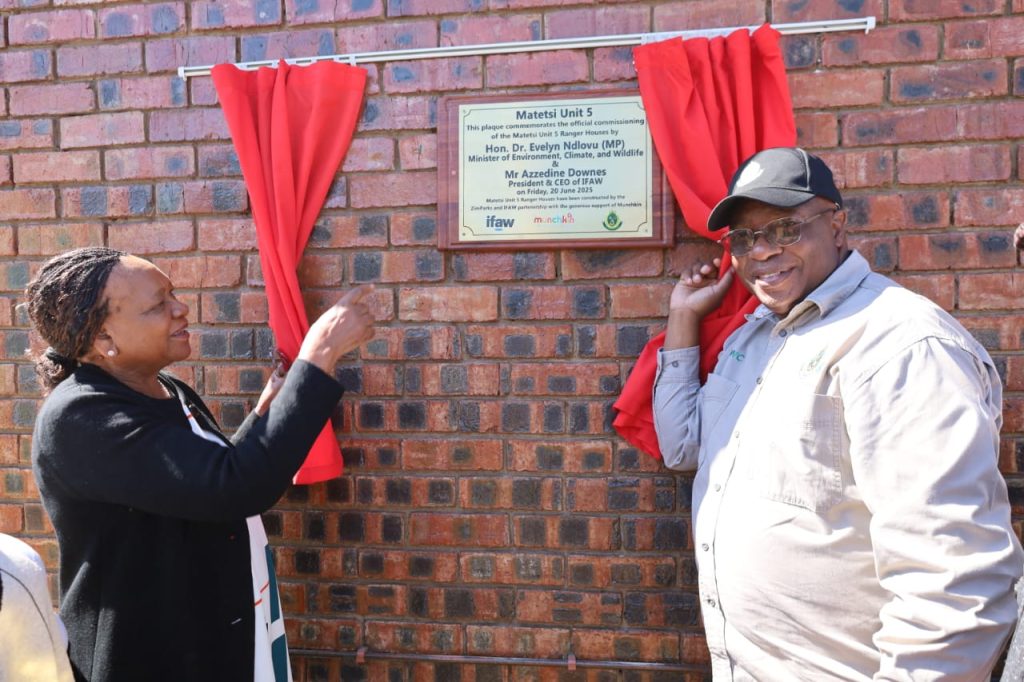
Minister of Environment, Climate and Wildlife, Evelyn Ndlovu, officially commissioning two houses in Matetsi Unit 5
John Cassim
In a show of continued support and commitment to wildlife conservation in Zimbabwe, through the Zimbabwe Parks and Wildlife Management Authority (ZimParks), the International Fund for Animal Welfare (IFAW) has commissioned two new ranger houses at Matetsi Unit 5, on the periphery of Hwange National Park.
Construction of the two houses began early last year at the cost of US$65,000 and were among various other construction projects by IFAW, including the recently completed IFAW office and staff accommodation in Hwange at a cost of US$100,000.
Minister of Environment, Climate and Wildlife, Evelyn Ndlovu, officially commissioned this project at a time when such houses are not just seen as structures but as empowerment for wildlife rangers.
“By investing in ranger welfare, the two organisations are doing more than just improving living conditions for our esteemed rangers. They are also enhancing our capacity to safeguard Zimbabwe’s treasured wildlife heritage and supporting the government’s broader efforts to promote nature-based tourism, which is key to both conservation and sustainable development,” said Dr. Ndlovu.
Built under the IFAW-ZimParks co-management agreement, the new ranger houses will accommodate eight rangers and provide comfortable, secure living conditions for those tasked with protecting the Matetsi Safari Area.
The handover ceremony, held at Matetsi Unit 5, was attended by government officials, conservationists, and community leaders. In her remarks, Zimbabwe’s Minister of Environment, Climate, and Wildlife, Dr. Evelyn Ndlovu, applauded IFAW and ZimParks for prioritizing ranger welfare.
The ceremony also featured the handover of tents and uniforms. To date, IFAW and ZimParks, with generous support from Munchkin, have invested more than US$1 million in Matetsi. This funding has been used to strengthen law enforcement—including the purchase of two patrol vehicles—support community-based conservation initiatives and alternative livelihoods, while improving the ecological function of the landscape.
“Matetsi is an important area for promoting elephant connectivity,” said Alleta Nyahuye, IFAW Zimbabwe Director. “This is why IFAW and ZimParks work so closely to address key conservation challenges in this landscape. Our vision is one of resilience—where a thriving wildlife population delivers lasting benefits to local communities.”
This region, which is part of IFAW’s Room to Roam priority landscapes, is a critical migratory route for elephants moving between Hwange National Park in Zimbabwe and Chobe National Park in Botswana, both part of the KAZA Transfrontier Conservation Area.
With over 5,000 elephants roaming the Hwange region and numerous other species thriving in this diverse ecosystem, the role of rangers has never been more critical as they tirelessly protect the natural treasures in the area, ensuring that future generations can experience the beauty of Zimbabwe’s rich biodiversity.
The relationship between IFAW and ZimParks began in late 2019. At that time, IFAW entered into its first conservation partnership with ZimParks, focusing on Hwange National Park. This partnership has since grown, with IFAW and ZimParks celebrating five years of collaboration in 2024, marked by significant investments in wildlife conservation, community development, and tourism development.
